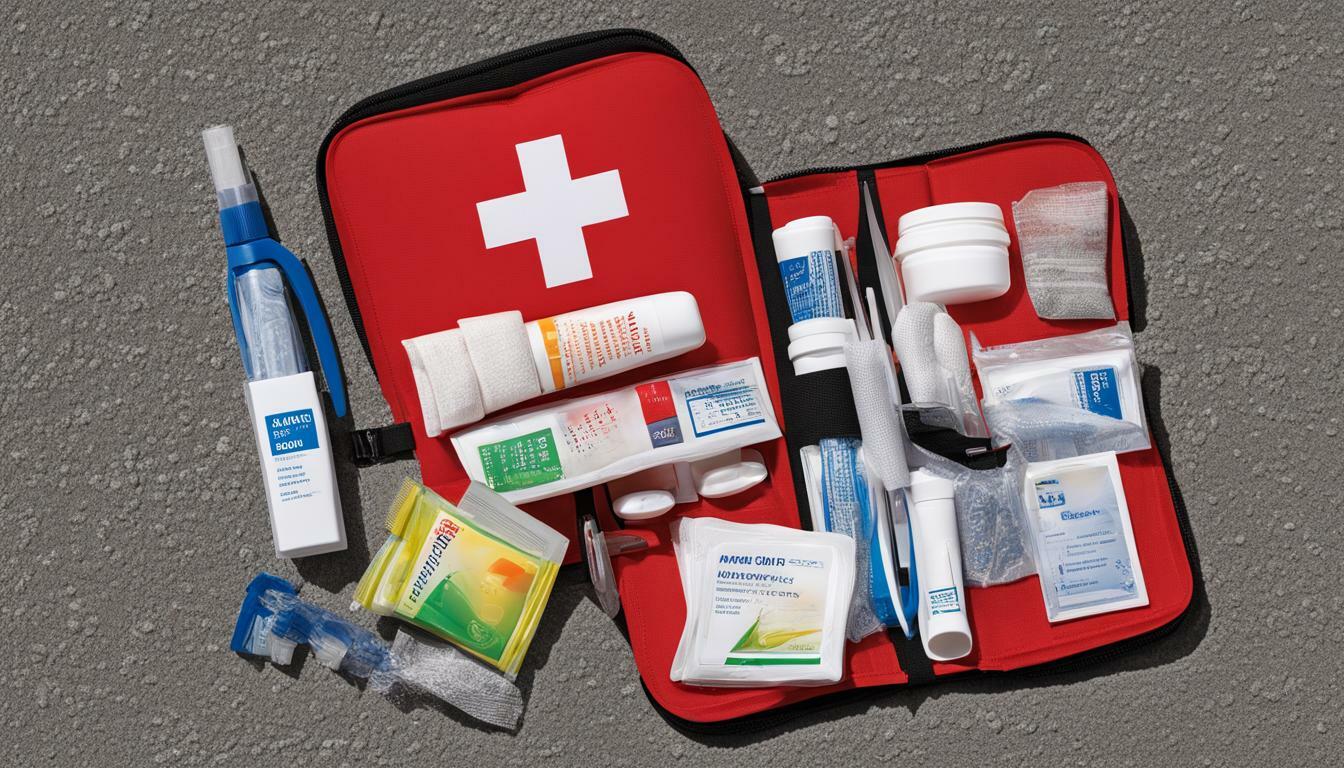Going on a road trip can be an exciting and unforgettable adventure. However, it’s important to prioritize safety while on the open road. One way to do this is by having a well-stocked first aid kit on hand. This kit should include essential items that can help you deal with unexpected injuries or emergencies that may occur while traveling. After all, being prepared can make all the difference in ensuring a safe and enjoyable trip.
Key Takeaways:
- Having a first aid kit is crucial for road trips
- Include essential items in your first aid kit such as bandages, antiseptic wipes, and pain relievers
- Emergency preparedness is vital for a safe and enjoyable trip
Road Trip First Aid Essentials: What You Need to Know
When planning for a road trip, it’s essential to consider some of the possibilities, including accidents, injuries, and illnesses that could derail your plans. One of the easiest ways to stay prepared is by packing a well-stocked first aid kit. Here are some of the road trip first aid essentials you should consider including in your travel first aid kit.
| Item | Description |
|---|---|
| Bandages | Be sure to pack a variety of bandages, including adhesive bandages in different sizes and shapes. Additional dressings such as gauze pads and sterile dressings are also essential in case of larger wounds. |
| Antiseptic Wipes | Antiseptic wipes such as alcohol pads are necessary to clean wounds before bandaging them. They can also be used to disinfect surfaces that come in contact with bodily fluids. |
| Pain Relievers | Pain relievers such as acetaminophen or ibuprofen can help alleviate headaches, muscle aches, and other minor pains that may occur during the trip. If you or anyone in your travel party has specific pain medication requirements, ensure you have an adequate supply. |
| Scissors and Tweezers | Scissors and tweezers are essential tools for administering first aid in case of accidents. They can be useful in cutting medical tape or removing foreign objects such as glass or splinters from wounds. |
| Thermometer | Fevers and other illnesses can occur unexpectedly, and a thermometer can help you determine when to seek medical attention. A digital thermometer is usually smaller and more convenient to use. |
| Prescription Medications | If anyone in your travel party takes prescription medication, ensure you have an adequate stock for the duration of the trip. Keep the medication in its original container, and carry a copy of the prescription with you in case you need to refill it. |
In addition to these essentials, you may also consider including items such as antihistamines for allergic reactions, electrolyte replacement packets, and sunscreen.
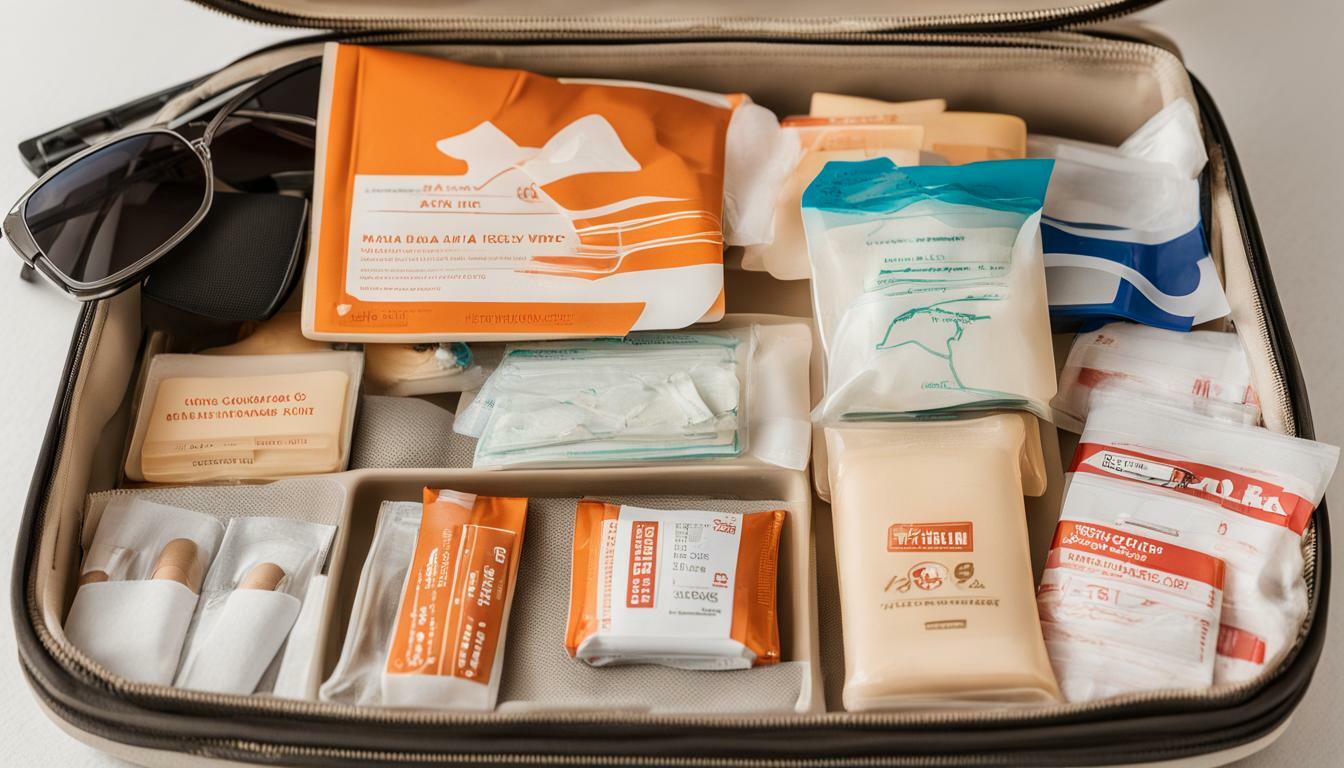
Remember always to check the expiration dates of the items in your first aid kit and restock them when necessary. A well-stocked first aid kit can be essential in managing emergencies while on a road trip.
Emergency Preparedness for Road Trips: Be Prepared for the Unexpected
Going on a road trip can be a wonderful adventure, but it’s important to be prepared for any emergency that may arise along the way. One essential item to have on hand is a first aid kit, which should be easily accessible and well-stocked with supplies. But what else should you consider when it comes to emergency preparedness for road trips?
Make a Plan
Before setting off on your road trip, take some time to plan out your route and identify any potential hazards along the way. This will help you to prepare for any emergencies that may arise and ensure that you have the necessary supplies and equipment on hand.
It’s also a good idea to familiarize yourself with the local emergency services in the areas you’ll be passing through, just in case you need to call for help in an emergency. Make sure to also share your travel plans with someone back home, so that they know where you are and can raise the alarm if anything goes wrong.
Stock Up on Supplies
In addition to a first aid kit, there are a few other supplies that you should consider bringing along on your road trip. These may include extra water, blankets, and warm clothing, as well as a flashlight and extra batteries. It’s also a good idea to have a roadside emergency kit on hand, which may include items such as a tire gauge, jumper cables, and a spare tire.
Check Your Vehicle
Before setting off on your road trip, it’s essential to make sure that your vehicle is in good working order. This means checking the tires, brakes, and oil levels, as well as ensuring that all lights and signals are working properly. It’s also a good idea to pack a few basic tools, such as a tire jack and wrench, in case you need to make any repairs along the way.
Stay Alert and Prepared
Finally, one of the most important things you can do to stay safe on the open road is to stay alert and prepared for any emergency that may arise. This means staying focused while driving, avoiding distractions, and taking regular breaks to rest and refresh yourself. If you do encounter an emergency, it’s important to remain calm and focused, and to take the necessary steps to ensure the safety of yourself and your fellow travelers.
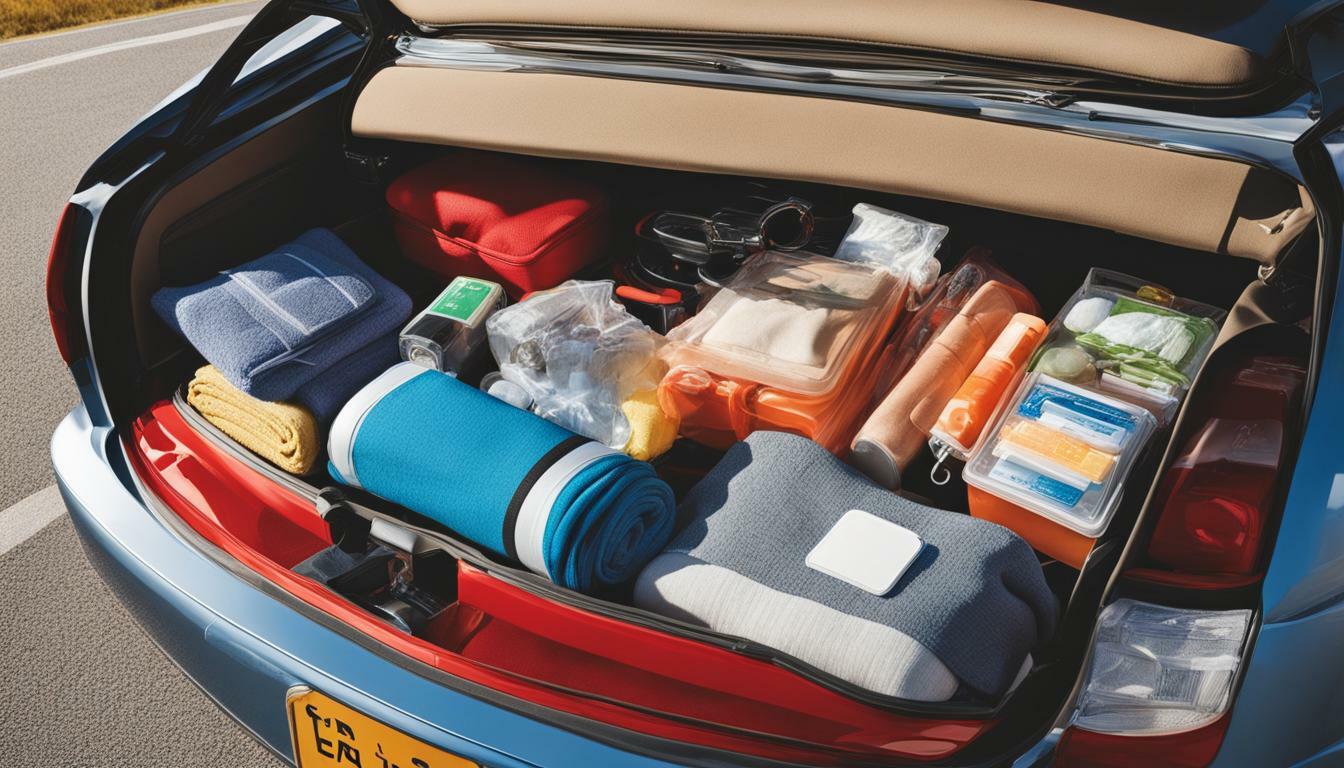
By following these tips and taking the necessary precautions, you can enjoy a safe and stress-free road trip, knowing that you’re prepared for any emergency that may come your way. So pack your bags, hit the open road, and enjoy all the adventure and excitement that the UK has to offer!
Safety Equipment for Long Drives: Protecting Yourself and Others
When it comes to road safety, having the right equipment can make all the difference. Long drives can be particularly challenging, so it’s important to be prepared with the necessary gear. In this section, we’ll explore some of the essential safety equipment you should consider bringing on your next road trip.
Reflective Vests
Reflective vests are a must-have safety item for anyone traveling on the open road. If you need to change a flat tire or perform any other roadside maintenance, a reflective vest will help ensure that other drivers can see you. Consider purchasing a high-visibility vest with reflective strips for maximum protection.
Warning Triangles
Warning triangles are another important safety item to consider. If your car breaks down or you need to stop on the side of the road, placing a warning triangle behind your vehicle can alert other drivers to slow down and be cautious. Make sure to choose a durable, high-quality triangle that is easy to set up and take down.
Fire Extinguisher
A fire extinguisher is a safety item that you hope you’ll never need, but it’s always better to have one just in case. Small fires can quickly turn into big problems, so having a fire extinguisher on hand can help prevent a disaster. Make sure to choose an extinguisher that is suitable for use in cars and that you know how to use it.
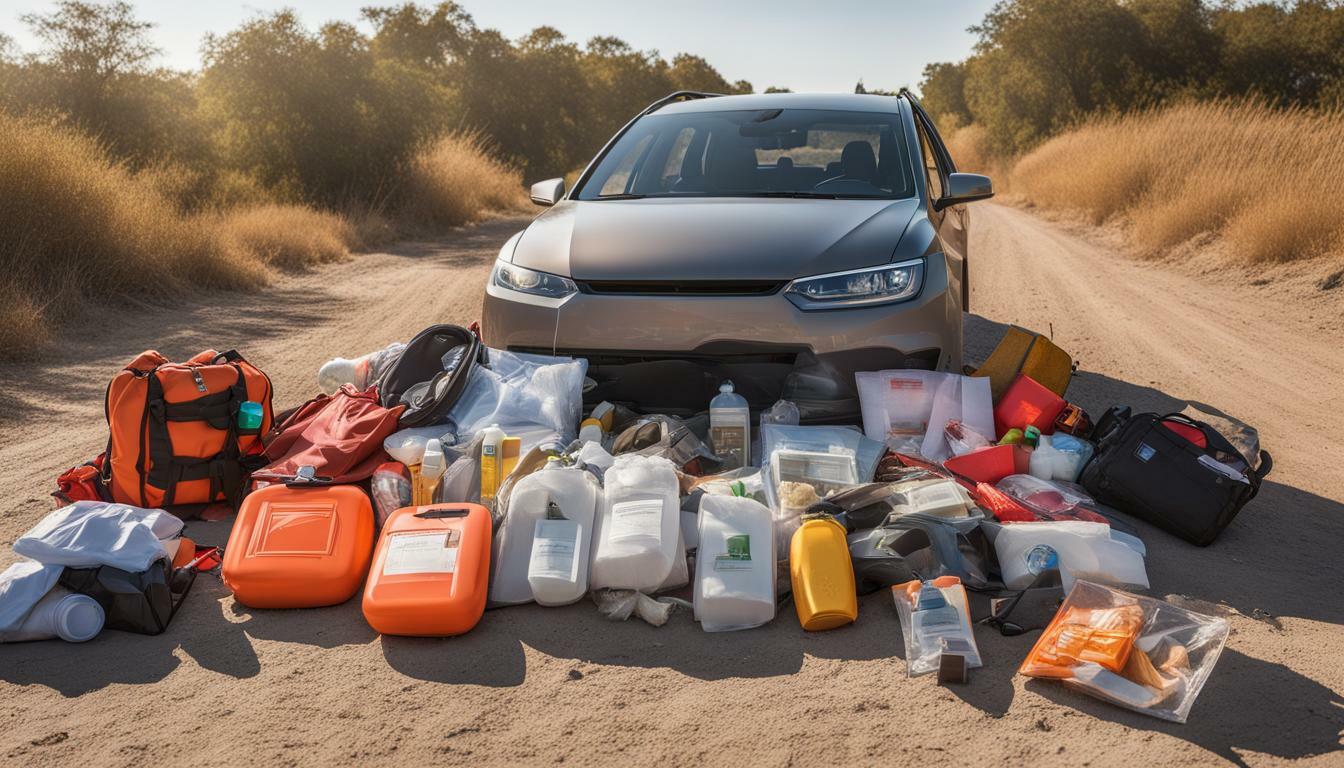 Safety Kits
Safety Kits
Safety kits are a great way to ensure that you have all the necessary equipment for a safe and enjoyable road trip. Consider purchasing a pre-made kit that includes items such as a first aid kit, flashlight, and multi-tool. Alternatively, you can create your own kit tailored to your specific needs.
Conclusion
When it comes to road safety, it’s important to be prepared for any situation. By investing in the right safety equipment, you can help protect yourself and others while on the open road. Remember to always follow traffic rules and be attentive while driving to ensure a safe and enjoyable journey.
How to Choose the Right First Aid Kit for Your Road Trip
Choosing the right first aid kit for your road trip is essential to ensuring you have the necessary supplies to handle any emergency. Here are some factors to consider when selecting a travel first aid kit:
- Size: Consider the size of your travel party and the length of your journey. A larger group and longer trip may require a bigger kit.
- Specific Needs: Think about any specific needs of your travel party, such as allergies or medical conditions, and ensure the kit includes any necessary medications or supplies.
- Regulations: Check the regulations or guidelines set by the country or region you are traveling to, as they may have specific requirements for first aid kits.
When looking for a first aid kit, opt for one that includes a range of essential items such as bandages, antiseptic wipes, pain relievers, and scissors. You may also want to consider a kit that includes items such as tweezers, a thermometer, or a snake bite kit depending on the activities and locations you plan to visit.
Remember, having a well-stocked first aid kit can give you peace of mind and help you feel more prepared for any situation that may arise on your road trip.
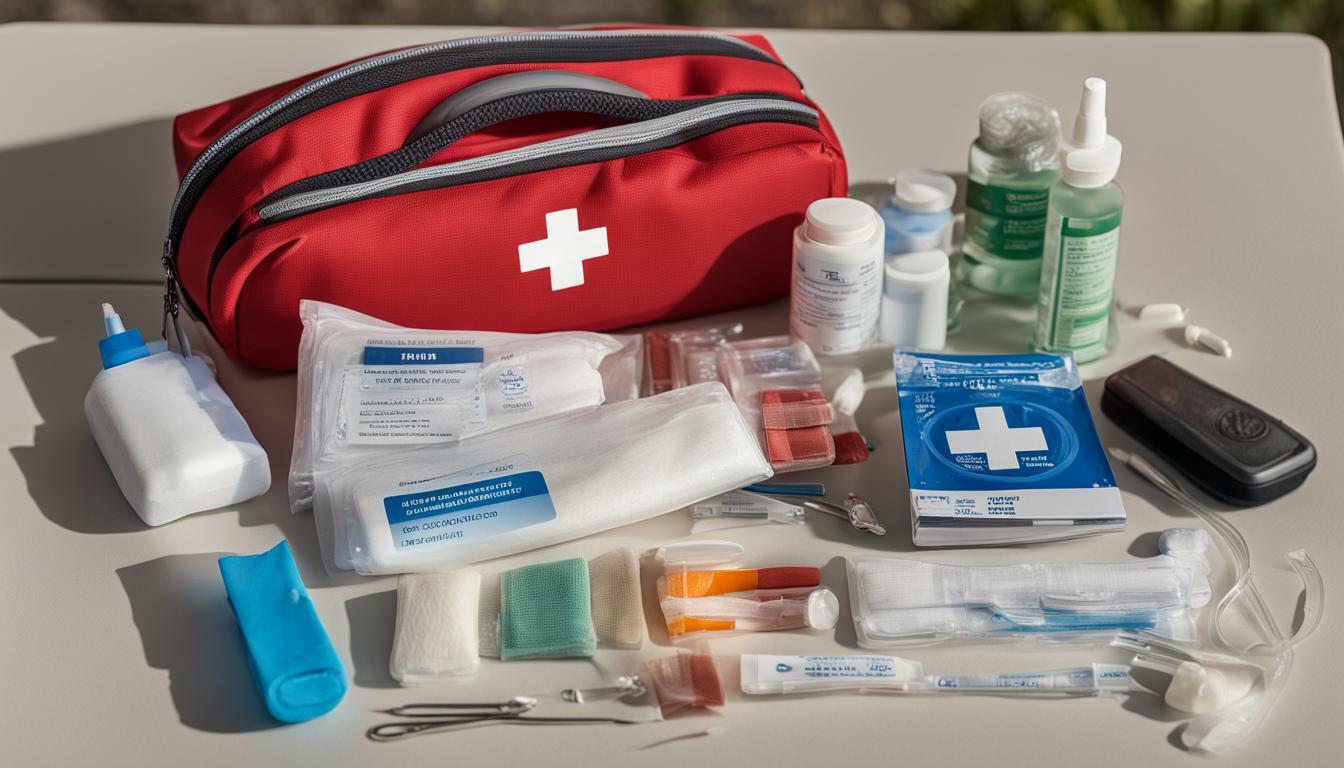
Tips for Maintaining and Restocking Your First Aid Kit
A well-stocked first aid kit is an essential item for any road trip. However, it’s important to remember that the contents of the kit may become depleted or outdated over time. Here are some tips to help you maintain and restock your travel first aid kit throughout your journey:
- Check the expiration dates on all items in your kit regularly, and replace any that have expired.
- Remove any items that have been used and replace them before your next trip.
- Add any additional items that may be necessary based on your planned activities or destinations.
- Consider the specific needs of your travel party. Do you have any individuals with medical conditions that may require additional supplies?
- Research the regulations and guidelines for the country or region you are traveling to. Certain items may not be allowed, or there may be specific requirements for the content of your first aid kit.
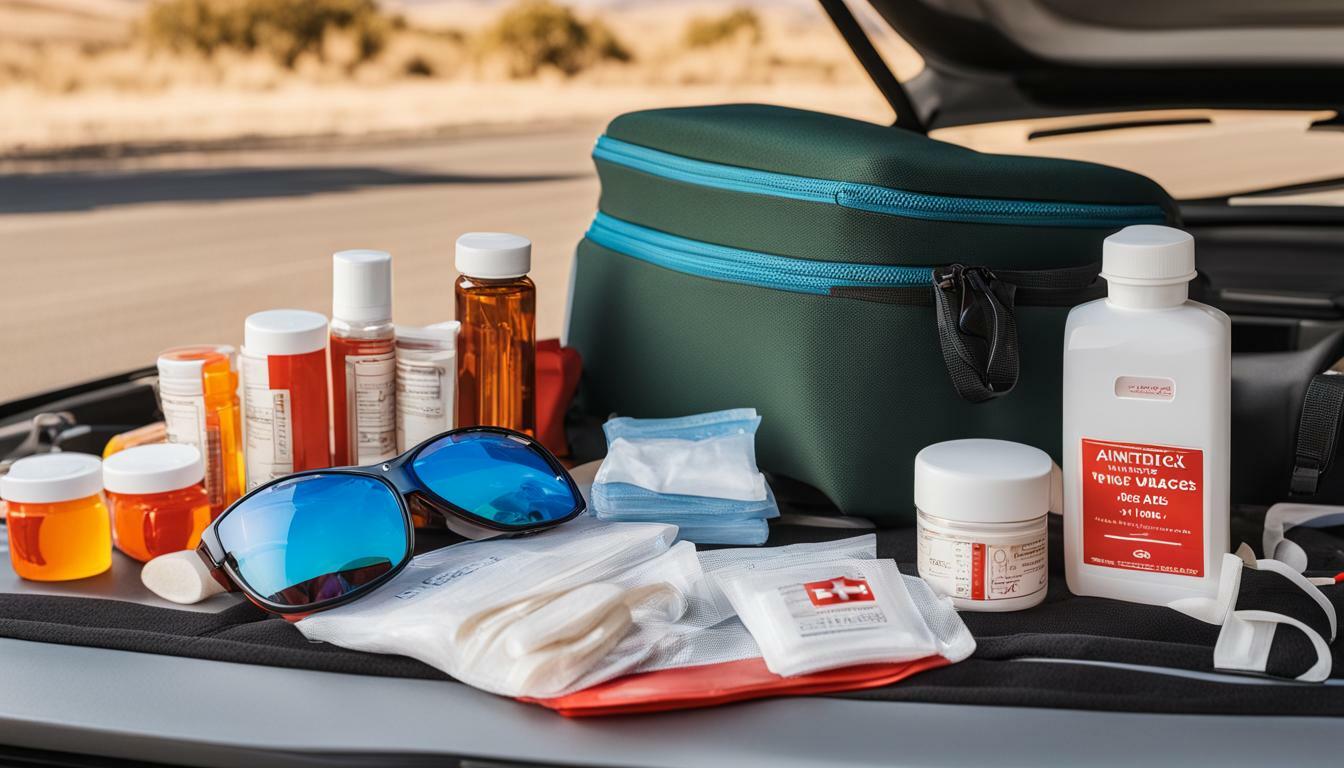
By following these simple tips, you can ensure that your first aid kit is always fully stocked and ready for any emergency that may arise during your road trip.
Dealing with Common Road Trip Injuries: A Guide
When travelling on the open road, it’s important to be prepared for any injuries or accidents that may occur. Having a well-stocked first aid kit is essential to ensure you can provide immediate treatment before seeking medical attention. Here are some common injuries that could happen during a road trip and how to deal with them:
Cuts and Scrapes
Small cuts and scrapes can happen during outdoor activities. If the wound is bleeding, use a clean cloth to apply gentle pressure to stop the bleeding. Clean the wound with an antiseptic wipe and apply a bandage. If the wound is deep, seek medical attention.
Burns
Burns can happen while cooking or enjoying a campfire. Run cool water over the burned area for 10 to 15 minutes. Cover the burned area with a sterile gauze bandage. Do not use ice or butter on the burn, as this can cause further damage.
Sprains
A sprain can happen while hiking or climbing. Rest and elevate the affected limb. Apply an ice pack to reduce swelling. Wrap the affected area with a compression bandage to reduce movement. If the pain does not subside, seek medical attention.
Insect Bites
Insect bites can cause irritation and discomfort. Clean the bitten area with an antiseptic wipe and apply a cold compress to reduce swelling. If you are allergic to insect bites and experience difficulty breathing or swelling, seek medical attention immediately.
Remember to always carry a well-stocked first aid kit when on a road trip and be prepared for any injuries or accidents that may occur. By taking the necessary precautions, you can have a safe and enjoyable journey.

Roadside Emergencies and First Aid: What You Need to Know
In the event of a roadside emergency, it’s important to stay calm and take the necessary precautions to ensure your safety and the safety of others. Having a well-stocked first aid kit on hand can be a lifesaver, but knowing how to administer basic first aid is also essential.
If you’re involved in a car accident, the first step is to call emergency services and provide them with your location and a description of the incident. While waiting for help to arrive, administer first aid to anyone who may be injured, using the supplies from your first aid kit. Keep in mind that moving someone who is injured could make their condition worse, so it’s best to wait for the professionals to arrive.
If your car is overheating or you have a flat tire, pull over to a safe location and turn on your hazard lights. Get out of the car and move to a safe distance away from the road. Use your reflective vest and warning triangles to make sure other drivers can see you. If you need to change a tire, make sure you have the necessary tools and follow the instructions in your car manual carefully.
Minor injuries such as cuts, burns, and insect bites can also happen while on a road trip. Use the items from your first aid kit to clean and dress the wound, and keep an eye on it for signs of infection. It’s also important to stay hydrated and get plenty of rest to help your body heal.
Remember, being prepared for emergencies is key to staying safe on a road trip. Make sure your first aid kit is well-stocked and up-to-date, and consider taking a first aid training course before your trip. With the right knowledge and supplies, you can handle any roadside emergency with confidence.
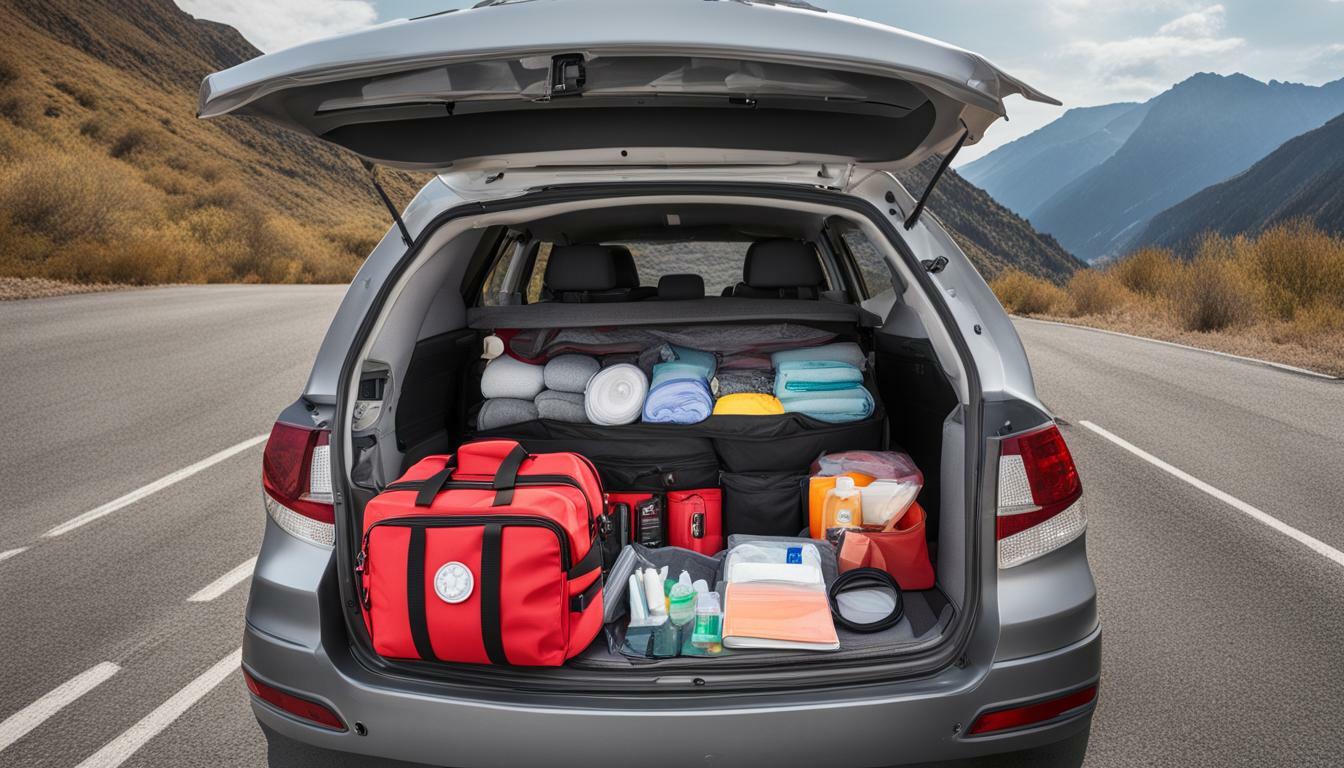
Additional Safety Tips for Road Trips: Staying Safe on the Go
When it comes to road trips, safety should always be a top priority. In addition to having a well-stocked first aid kit and safety equipment, there are other steps you can take to ensure a safe and enjoyable journey. Here are some additional safety tips to keep in mind:
- Wear your seat belt: This may seem like an obvious one, but it’s surprising how many people still don’t wear their seat belts. Make sure everyone in the car is buckled up before setting off.
- Take regular breaks: Long drives can be tiring, so it’s important to take breaks every couple of hours. Stop at a rest area or petrol station to stretch your legs, grab a snack, and use the bathroom.
- Avoid distractions while driving: Texting, eating, and even adjusting the radio can all be distractions that take your focus away from the road. Keep your attention on driving and avoid any distractions that could lead to an accident.
- Follow traffic rules: This may also seem obvious, but it’s important to follow traffic rules and obey speed limits. Keep an eye out for road signs and be aware of any changes in speed limits or road conditions.
- Keep alert: Driving at night or in bad weather can be challenging, so make sure you’re well rested and alert before hitting the road. If you feel tired, pull over and take a nap or switch drivers.
- Have emergency supplies: In addition to your first aid kit and safety equipment, it’s a good idea to have other emergency supplies on hand such as food, water, and warm blankets. These supplies can come in handy if you get stranded or stuck in bad weather.
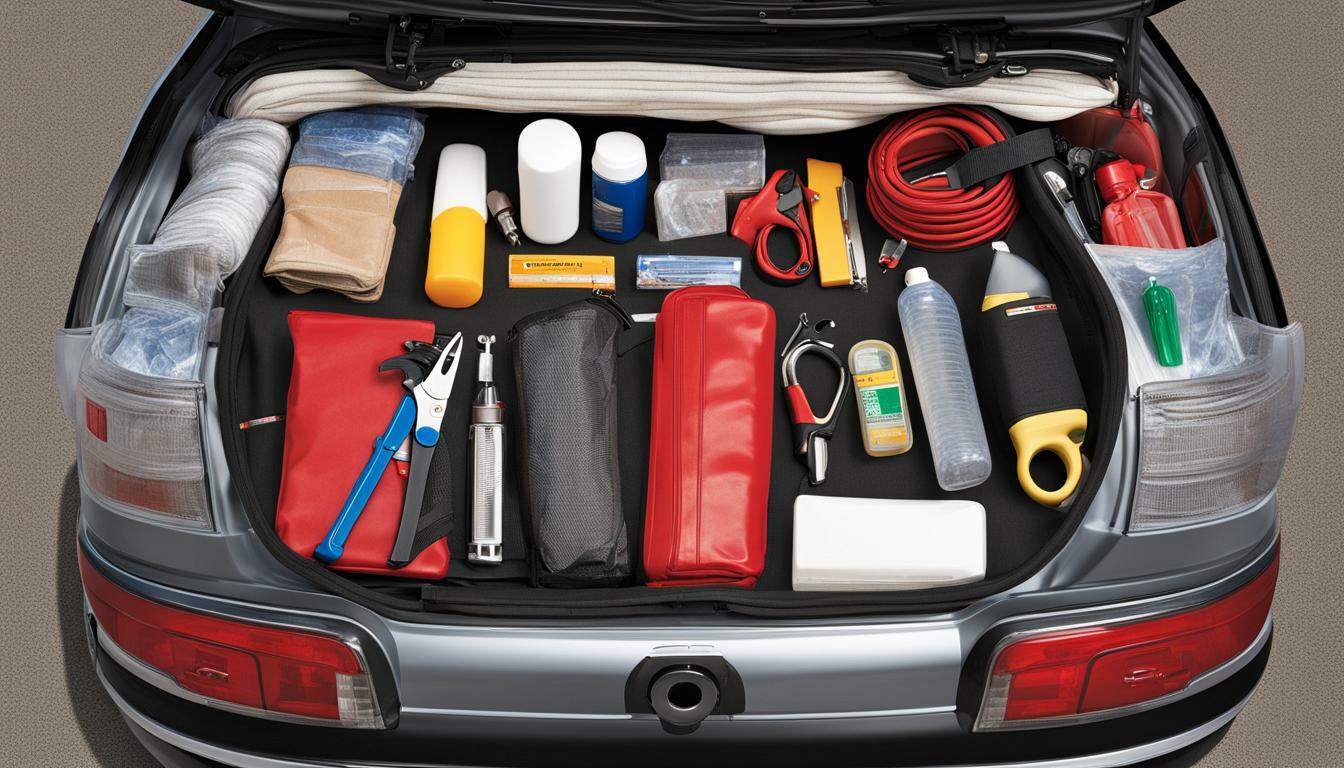
By following these additional safety tips, you can ensure a safe and enjoyable road trip. Remember, it’s better to be overprepared than underprepared when it comes to safety on the open road.
The Importance of First Aid Training for Road Trips
When it comes to road trip safety, having a well-stocked first aid kit is essential. However, it’s equally important to have the knowledge and skills to administer first aid in an emergency situation. This is where first aid training comes in.
First aid training equips individuals with the necessary skills to handle a variety of emergency situations, from treating minor injuries to performing CPR. With this knowledge, you can provide critical assistance to others in need and potentially even save lives.
When planning a road trip, it’s wise to consider taking a first aid course prior to departing. This will help you feel confident and prepared should an emergency arise while on the open road. In addition to providing peace of mind, first aid training may even be a legal requirement in some countries or regions.
During a first aid course, you’ll learn important skills such as how to assess a patient’s condition, control bleeding, and treat wounds. You’ll also learn how to properly administer CPR, provide aid for choking, and manage other life-threatening situations.
Of course, simply taking a first aid course is not enough. It’s important to regularly refresh your knowledge and skills to ensure that you are prepared for any emergency situation that may arise. This includes regularly restocking and maintaining your first aid kit.
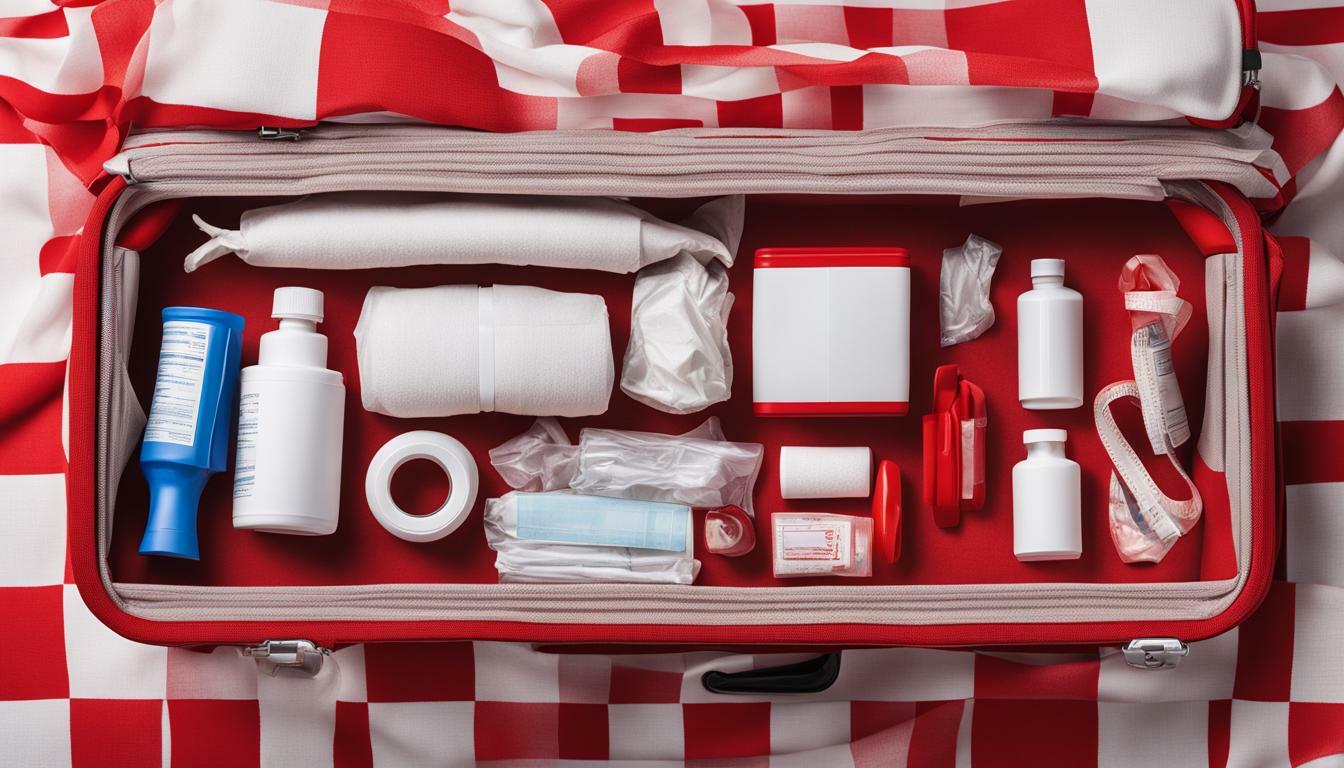
In summary, having a well-stocked first aid kit is important for road trip safety, but it’s equally important to have the knowledge and skills to administer first aid in an emergency situation. Consider taking a first aid course prior to your road trip to prepare yourself for any potential emergencies. With the right safety measures in place, you can ensure a safe and enjoyable experience on the open road.
Road Trip Safety Checklist: Don’t Forget These Essentials
Before embarking on a road trip, it’s essential to ensure you have all the necessary safety equipment and first aid supplies. Use this comprehensive checklist to make sure you don’t forget anything:
Road Trip First Aid Essentials
- Bandages of various sizes
- Gauze pads and adhesive tape
- Antiseptic wipes and ointment
- Pain relievers such as ibuprofen and acetaminophen
- Tweezers and scissors
- Instant ice packs
- Thermometer
- Disposable gloves
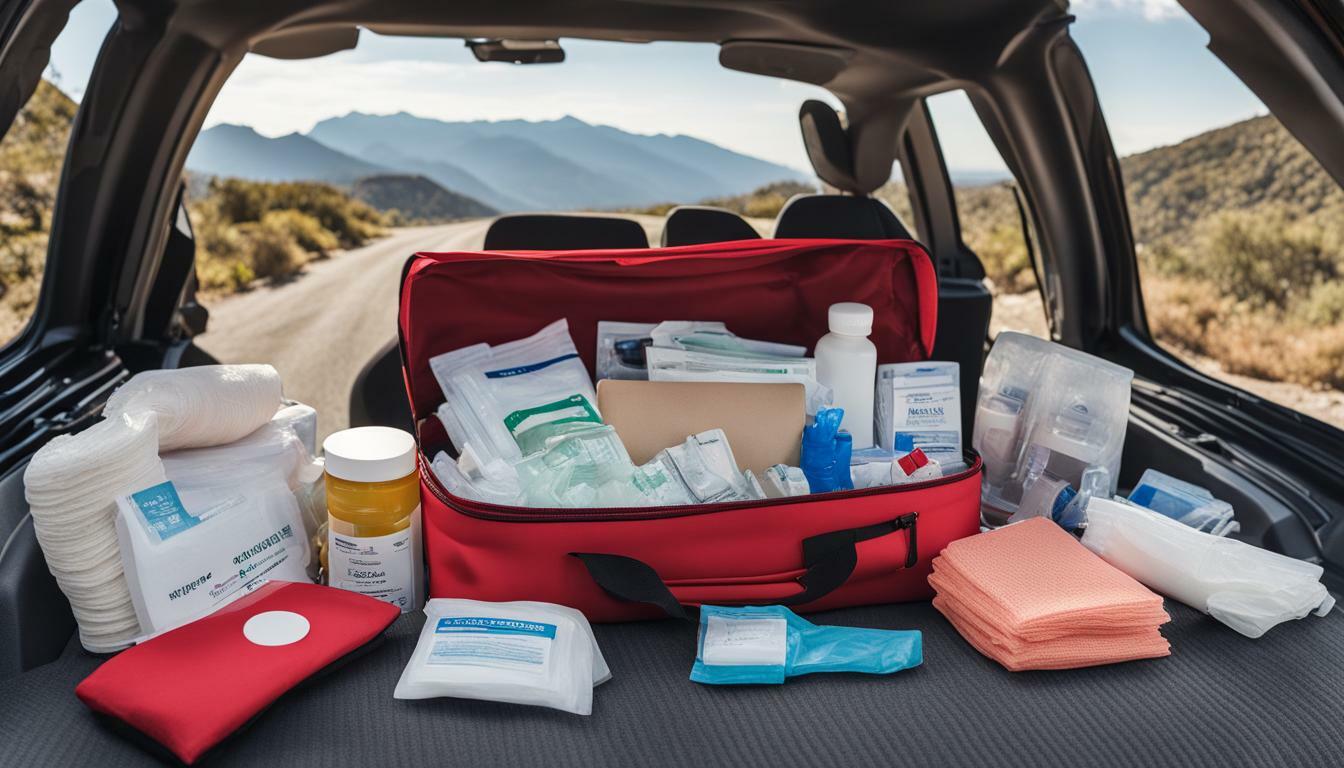
Safety Equipment for Long Drives
- Reflective vest for each traveler
- Warning triangles or flares
- Jumper cables
- Tire pressure gauge
- Fire extinguisher
- Flashlight and extra batteries
- Blanket or warm clothing
- Non-perishable snacks and water
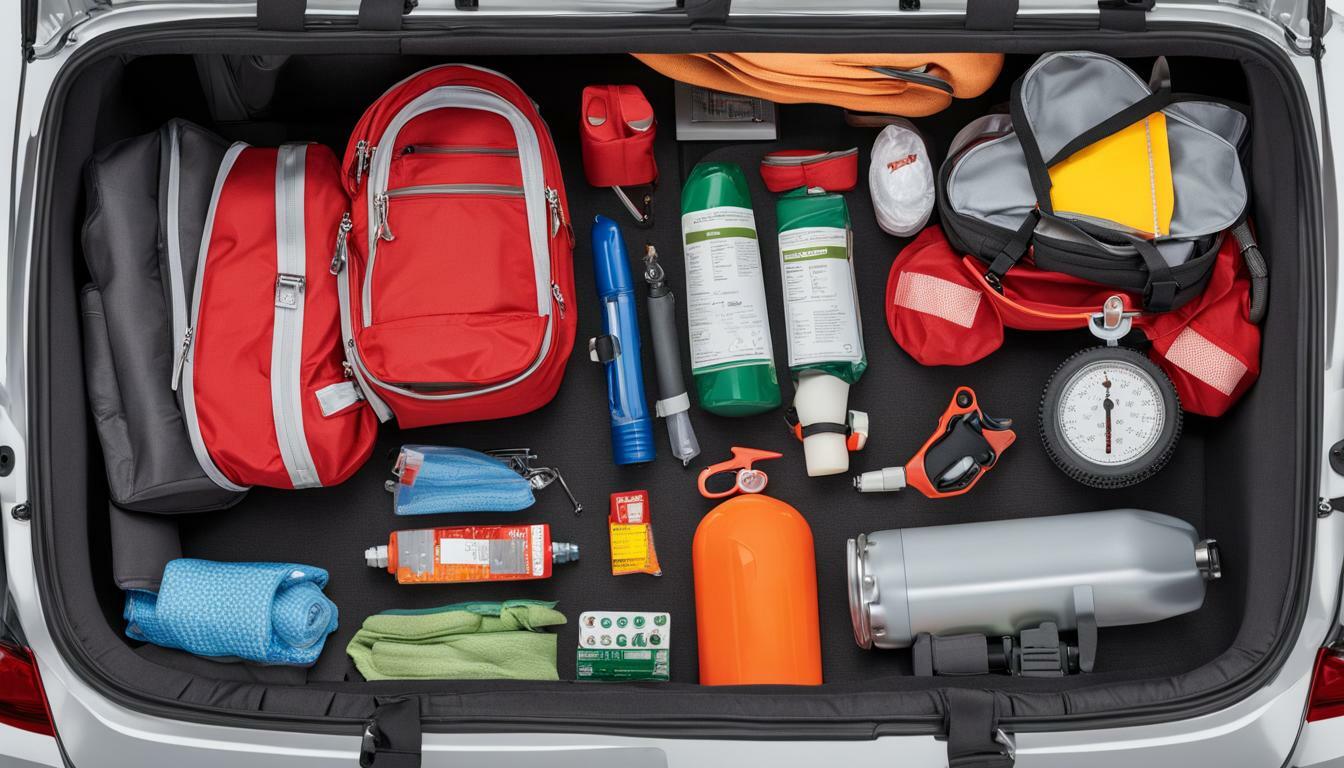
By ensuring you have all of the above items, you’ll be well-prepared for any emergency that may arise during your road trip. Pack your first aid kit and safety equipment in an easily accessible location, such as the trunk or glove compartment, and remember to regularly check and restock them throughout your journey.
The Importance of First Aid Kits and Safety Supplies on Road Trips
Embarking on a road trip is exciting, and the open road offers endless possibilities for adventure. However, it’s important not to overlook safety while travelling. Accidents can happen at any time, and being prepared with a well-stocked first aid kit and proper safety equipment can make all the difference.
First Aid Kits for Road Trips
When it comes to road trips, having a first aid kit on hand is essential. A typical first aid kit should include bandages, antiseptic wipes, pain relievers, and scissors. It’s also a good idea to include any prescription medications that members of your travel party are taking. Choosing the right first aid kit can be tricky, so be sure to consider the size of the kit, specific needs of your travel party, and any regulations or guidelines set by the country or region you are travelling to.
Road Trip Safety Supplies
In addition to a first aid kit, there are other safety supplies that can come in handy on a road trip. Reflective vests and warning triangles can make you more visible in case of a breakdown or accident, and a fire extinguisher can help put out small fires. It’s important to remember to check the expiration dates on all of your safety supplies to make sure they are in working order when you need them.
Emergency Preparedness for Road Trips
Emergency situations can arise on any road trip, so it’s important to be prepared. Along with a first aid kit and safety supplies, it’s a good idea to have a roadside emergency kit that includes a flashlight, extra batteries, and basic tools like a wrench and screwdriver. Be sure to research the areas you’ll be travelling through for any potential weather hazards or other emergency situations.
Dealing with Common Road Trip Injuries
Even with the best preparation, injuries can occur while on a road trip. Basic first aid techniques for cuts, burns, sprains, and insect bites should be learned and emphasized. Being prepared with a well-stocked first aid kit can make the difference between a minor injury quickly treated, or a major one evolving into a disaster.
Conclusion: Safe and Enjoyable Road Trips Ahead
Ensuring that you have a well-stocked first aid kit and appropriate safety supplies can provide peace of mind and make any road trip safer and more enjoyable. Remember to regularly check expiration dates and restock your supplies throughout your travels. With proper preparation, you can enjoy the open road with confidence and ease.
